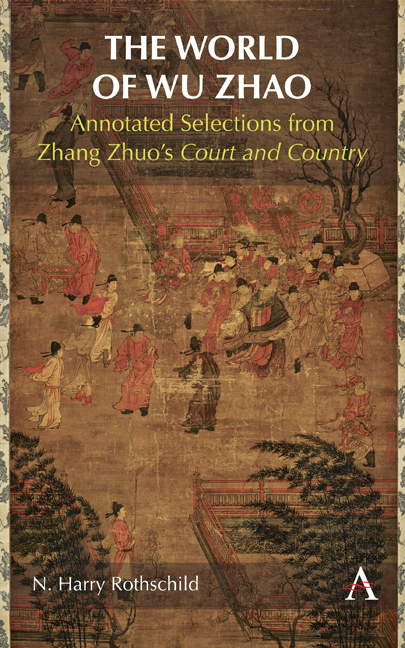Book contents
- Frontmatter
- Dedication
- Contents
- Acknowledgments
- Figures
- Map
- Tables
- Weights and Measures
- Introduction
- Chapter 1 Wu Zhao: her inner palace, her inner circle
- Chapter 2 The culture of the court
- Chapter 3 “Cruel officials”: Wu Zhao’s “teeth and horns”
- Chapter 4 Beyond court and capital: local officials
- Chapter 5 The common people
- Chapter 6 Relationships: men, women, and family in the time of Wu Zhao
- Chapter 7 Generals and military men
- Chapter 8 The frontier and beyond: foreigners and others during Wu Zhao’s reign
- Chapter 9 Religion and the supernatural world
- Chapter 10 Flora, fauna, and the natural world
- Afternote
- Appendix: People and Places
- Notes
- Bibliography
- Index
Chapter 4 - Beyond court and capital: local officials
Published online by Cambridge University Press: 15 November 2023
- Frontmatter
- Dedication
- Contents
- Acknowledgments
- Figures
- Map
- Tables
- Weights and Measures
- Introduction
- Chapter 1 Wu Zhao: her inner palace, her inner circle
- Chapter 2 The culture of the court
- Chapter 3 “Cruel officials”: Wu Zhao’s “teeth and horns”
- Chapter 4 Beyond court and capital: local officials
- Chapter 5 The common people
- Chapter 6 Relationships: men, women, and family in the time of Wu Zhao
- Chapter 7 Generals and military men
- Chapter 8 The frontier and beyond: foreigners and others during Wu Zhao’s reign
- Chapter 9 Religion and the supernatural world
- Chapter 10 Flora, fauna, and the natural world
- Afternote
- Appendix: People and Places
- Notes
- Bibliography
- Index
Summary
WU ZHAO’S ZHOU DYNASTY CONTAINED ROUGHLY 350 prefectures (zhou 州), presided over by Prefects, and 1500 districts (xian 縣), administered by magistrates. Each prefecture was broken into three to six districts. “As late as 657,” Denis Twitchett observes, “there were only 13,465 ranking officials to control a population perhaps in excess of 50,000,000.” With a population of 50 million people in the early Tang empire, the average magistrate was responsible for 60,000 people. The primary role of these local officials was to collect revenues—grain and cloth tax—and to coordinate corvée labor. Prefects with appointments in and around the capital were often up-and-coming men on a fast track to promotions to higher-ranked positions in the imperial court. On the other hand, a court official guilty of offending the ruler or committing minor malfeasance might be punished with a demotion to become a local official in a remote district. As in any other culture, premodern or modern, some local administrators were conscientious, competent, and effective, while others were negligent, inept, and avaricious. While stories of both good and bad local officials appear in Court and Country, Zhang Zhuo was clearly partial to the more lurid stories of maladministration, power-mongering, and staggering incompetence.
JUDICIOUS PEI ZIYUN SOLVES THE CASE OF THE MISSING COWS
Known as the “father-and-mother official,” the county magistrate was the lowest-level official who was part of the formal government bureaucracy. They were aided (or, at times, hindered) by an extensive sub-bureaucracy of clerks, village heads, local elders, wardens, bailiffs, strongarms, and runners. In addition to reporting to the Prefect, these magistrates were also responsible for levying grain and cloth taxes; managing floods and droughts; supervising construction and repair of dikes, roads, and bridges; adjudicating local disputes; and solving crimes. Thus, these local officials were also detectives. Extensive Records places the passage from Court and Country below in its chapters on “Brilliant Investigators” (jingcha 精察):
In Xinxiang County of Weizhou, magistrate Pei Ziyun was an excellent strategist. Wang Jing was conscripted to a border garrison, and he left six milch cows with his uncle Li Jin. Over the five years Li cared for them, the cows birthed thirty calves, each worth more than ten strings of cash. When Wang Jing returned from the border, two of the cows had died and only four remained.
- Type
- Chapter
- Information
- The World of Wu ZhaoAnnotated Selections from Zhang Zhuo's <i>Court and Country</i>, pp. 87 - 98Publisher: Anthem PressPrint publication year: 2023

